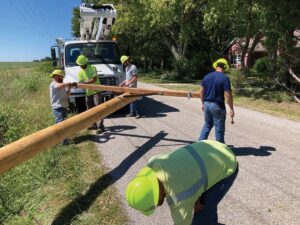 As we wrap up International Year of the Cooperative, what better organization to recognize than the NRECA International Program, a division of the National Rural Electric Cooperative Association (NRECA). On Nov. 1 the program celebrated 50 years of helping developing countries provide rural residents with safe, reliable and affordable electric service. The program epitomizes the cooperative principle of cooperation among cooperatives — people helping people.
As we wrap up International Year of the Cooperative, what better organization to recognize than the NRECA International Program, a division of the National Rural Electric Cooperative Association (NRECA). On Nov. 1 the program celebrated 50 years of helping developing countries provide rural residents with safe, reliable and affordable electric service. The program epitomizes the cooperative principle of cooperation among cooperatives — people helping people.
Since its creation in 1962, the NRECA International Programs has assisted with electrification efforts that have resulted in increased agricultural productivity, millions of new jobs, as well as an enhanced quality of life for more than 100 million people in 40-plus nations. Projects are currently under way in Afghanistan, Bangladesh, Bolivia, Costa Rica, Dominican Republic, El Salvador, Guatemala, Haiti, the Philippines, South Sudan, Tanzania, Uganda and Yemen.
 “Almost 66 percent of the world’s population still lacks electricity or must depend on unreliable and unsafe power,” says Ingrid Hunsicker, Manager of International Program Development for the NRECA International Foundation, a charitable organization that partners with electric cooperatives in the United States to bring power and economic development to rural villages overseas. “That’s where the foundation comes in – it adds value to NRECA International Programs initiatives.”
“Almost 66 percent of the world’s population still lacks electricity or must depend on unreliable and unsafe power,” says Ingrid Hunsicker, Manager of International Program Development for the NRECA International Foundation, a charitable organization that partners with electric cooperatives in the United States to bring power and economic development to rural villages overseas. “That’s where the foundation comes in – it adds value to NRECA International Programs initiatives.”
When natural disasters happen, the NRECA International Foundation is able to jump in and send aid, such as when much of Haiti’s electrical infrastructure was destroyed by an earthquake in 2010.
Because conditions vary so widely, the NRECA International Program has adopted the slogan, “Electrifying the world…one village at a time.” The outreach relies on the time-tested electric cooperative business model – giving individuals, many for the first time, practical experience in democratic decision-making and free enterprise so they can launch locally driven services. Best of all, by aggregating small stakeholders into large-enough units to compete in the marketplace, cooperatives expand the critical people-to-people relationships needed to break down mistrust – a way to tackle terrorism and anti-U.S. sentiment on a grassroots level.
Electric cooperatives and their employees from across the U.S. volunteer time and supplies to provide locals with comprehensive training programs needed in all aspects of utility operations to ensure that local institutions can effectively and efficiently operate and administer a functioning and economically viable utility.
 Here in Illinois, several managers and employees from the Association of Illinois Electric Cooperatives in Springfield, Adams Electric Cooperative in Quincy, Illinois Rural Electric Cooperative in Winchester and Shelby Electric Cooperative in Shelbyville have volunteered their time and talents to help assess programs
Here in Illinois, several managers and employees from the Association of Illinois Electric Cooperatives in Springfield, Adams Electric Cooperative in Quincy, Illinois Rural Electric Cooperative in Winchester and Shelby Electric Cooperative in Shelbyville have volunteered their time and talents to help assess programs
and train workers in Guatemala, Haiti and Pakistan.
“One of the challenges we face in many countries is building a rural business culture,” stresses Hunsicker. “When electric cooperative employees and volunteers from the United States arrive, they outline how to create a business plan, conduct meetings, collect the full amount due from consumers, determine what type of electric generation they should invest in, and everything in between. It’s all about finding out and building on what will work. Through these efforts, we show the best face of not only who we are as electric co-ops but as Americans.”







